Displaying 21 - 40 of 43
G7 must address famine
22 May 2017
Faith-based groups bring hope for a fast-track HIV response
20 September 2016
Religion: Way of war or path to peace?
30 June 2016
New Executive Committee members elected in Trondheim
28 June 2016
USA Racial Justice Accompaniment Visit
18 April 2016
International affairs facilitator reflects on pilgrimage
31 March 2016
At UN, anti-nuclear majorities challenge nuclear-dependent minority
05 November 2015
Church leaders address statelessness in Dominican Republic
03 February 2015







